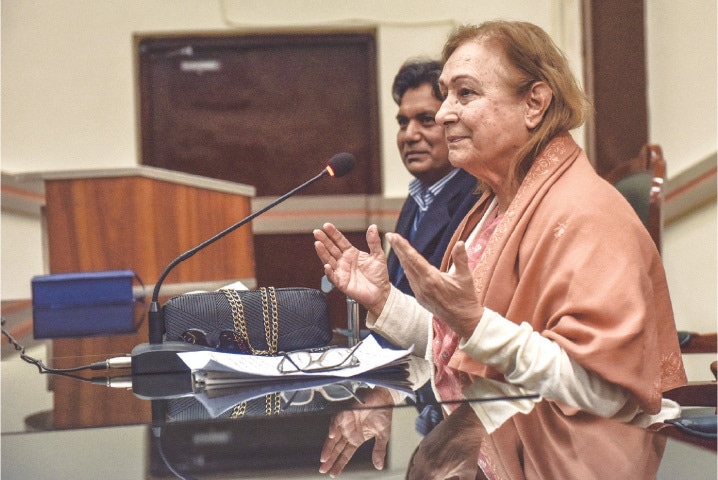
KARACHI: Pakistan should stand by its policy of not allowing the US to use Pakistani soil against Iran. This was the point that scholar Prof Dr Talat Wizarat stressed upon in the final part of her lecture on ‘The current state of Iran-US relations: implications for Pakistan’ at a seminar organised by the Department of International Relations, University of Karachi on Thursday morning.
Dr Wizarat, who is a former chairperson of the department, said people envy the Middle East since they say it’s full of resources. “I feel sorry for it, because although the region is full of resources, greedy eyes and hands have plundered them, not allowing the people to gain from their own resources.”
Dr Wizarat said the conflict between Iran and the US is an ideological one. Even if you believe that ideology doesn’t matter much, it is still important. [Samuel] Huntington gave impetus to this saying religious conflicts are going to consume the world. He sees the main conflict between Islamic and Western civilisations.
The scholar said Iran is also a resource-rich country. In the 1950s, the people of Iran elected Mosaddegh, who was a popular politician. He saw that while Iranians were suffering after WWII, the Western oil companies were taking all the oil away from Iran. He decided to nationalise the oil [industry] of Iran. The West raised hue and cry about it. The CIA toppled his government and brought back the Shah.
Then, soon after the Islamic Revolution, there was the hostage crisis. The West lectured Iran about international law. Finally they launched the move to liberate the hostages which failed. It proved to be a setback to US influence in Iran. After that the US navy downed a civilian Iranian aircraft which was going to Dubai. Hundreds of civilians died in the incident. Pakistan’s navel attaché to Iran and his family also died in it. The US has not apologised to Iran. “It was sheer violation of international law.”
Dr Wizarat said one has to look at American goals in the region to which the US sees Iran as a hurdle. The first goal is that it wants regime change in many countries. They were successful in Afghanistan; they did that in Iraq (Saddam Hussein); and killed Qadhafi in Libya. Now they wanted to turn their attention to Syria to change the government of Bashar al-Assad. They started a civil war in Syria. Iran became an obstacle in their way by supporting Assad. Russia also joined on the side of Assad.
The second goal, she argued, is that the US wants to establish Israeli hegemony over the region. Although Iran is militarily not as strong as Israel, the West sees Iran and all resistance movements in the area as a hurdle.
The US’s third goal is that it wants to break up states of the region. It wants to prop up the Kurds and to create a Kurdish state.
Dr Wizarat said Turkey is an important power. It might become a global power after 2023 when restrictions on it will be removed. If a group is formed involving countries such as Malaysia, Iran, Pakistan and Saudi Arabia, it’s going to support the ummah. “There’s an ummah. It’s our fault if we’re not able to put life into it. There’s potential in it.”
The next part of her talk was about the immense resources in the region. She said the US wants to control these resources and deny all of these resources to China, because they think China is becoming a big economic power.
Dr Wizarat said the US will not have the courage to attack Iran. Tactics have changed. They are thinking about regime change in Iran. But the Iran of today is different from the Iran of the 1950s. “I’m not sure if they’ll be able to bring about the change.” The scholar also had a word of caution for Iran: it’s in Iran’s interest to take all the countries [Saudi Arabia and the UAE] together. “Some of us wonder will Saudi Arabia and Iran ever get together. Everyone must see the writing on the wall. If Iran and the Taliban can talk to each other, why can’t Iran and Saudi Arabia?”
As for Pakistan, Dr Wizarat pointed out no state can gain anything from a war in the region. If a regional country is destabilised, there’s a flow of refugees. And no country is in a position to accept that. We made an error in the Musharraf era when we supported American aggression against Afghanistan. “We can help Iran by not letting the US use our soil against it.” The policy has been announced and I hope we will stand by this smart policy, she added.
Published in Dawn, January 17th, 2020













































Dear visitor, the comments section is undergoing an overhaul and will return soon.